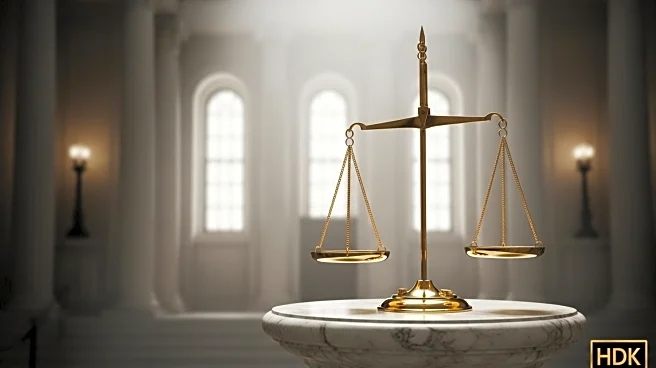What's Happening?
Justice Amy Coney Barrett has emphasized that Supreme Court rulings should not reflect the personal beliefs of its judges, as the court considers a request to overturn the legalization of same-sex marriage. In a preview of an interview with CBS News Sunday Morning, Barrett stated that the court should not impose its values on the American people, suggesting that such decisions should be left to the democratic process. Barrett's comments come as she promotes her new book, 'Listening to the Law: Reflections on the Court and Constitution,' where she discusses her views on the court's role in major rulings, including the 2022 decision that struck down national abortion rights. Despite public opinion polls showing significant support for same-sex marriage, Barrett and her colleagues face a request to overturn the 2015 Obergefell v Hodges ruling, which recognized same-sex marriage as a constitutional right.
Why It's Important?
The discussion around the Supreme Court's role in shaping social policy is significant as it highlights the tension between judicial interpretation and public opinion. Barrett's remarks underscore the ongoing debate about the court's influence on issues like same-sex marriage and abortion rights, which have profound implications for American society. The potential overturning of the Obergefell decision could lead to a patchwork of state laws regarding same-sex marriage, affecting millions of Americans. This situation reflects broader questions about the balance of power between the judiciary and democratic processes, and how landmark decisions can shift societal norms and legal precedents.
What's Next?
The Supreme Court's decision on whether to revisit the Obergefell ruling will be closely watched, as it could set a precedent for how the court approaches other established rights. Stakeholders, including LGBTQ+ advocacy groups and political leaders, are likely to respond strongly to any changes in the legal status of same-sex marriage. The court's actions may also influence upcoming legislative efforts at both state and federal levels, as lawmakers consider how to address potential changes in marriage laws.
Beyond the Headlines
The potential revisiting of the Obergefell decision raises ethical and cultural questions about the role of the judiciary in protecting minority rights against majority rule. It also highlights the long-term impact of Supreme Court appointments and the ideological shifts that can occur with changes in the court's composition. Barrett's comments and her book may contribute to ongoing discussions about judicial philosophy and the interpretation of constitutional rights.










